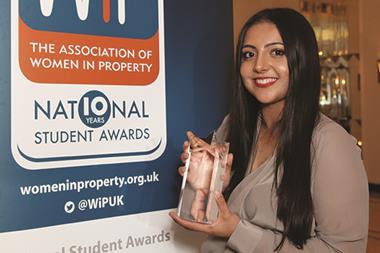At the end of last month, senior figures from across the industry gathered at the upmarket Claridge’s hotel in London for the 2017 Women in Property (WiP) National Student Awards, sponsored by Bouygues UK, Cushman & Wakefield and Linden Homes.

Now in their 11th year, the awards recognise future stars in property-related disciplines as varied as surveying, planning, architecture and engineering. As the guests gathered, they already knew the identities of the 13 regional winners, who had seen off competition from 92 other students from 44 universities across the UK. What they did not know was who would emerge as the national winner.
The guest of honour was Alison Nimmo, chief executive of The Crown Estate. After an introduction from WiP chair Brenda Jones, Nimmo urged all the finalists to “own your own career”, adding: “Too many women underestimate their own talent. Be the leader you wish you had, building diverse teams around you, and remember that life begins outside your comfort zone. Boundaries are there to be pushed.”
She then announced that the judges had unanimously decided on the national winner - Caitlin Mitchell, a third-year civil and coastal engineering student at the University of Plymouth, whom the judges described as “having great enthusiasm and vibrancy”. They added: “She has a strong, dynamic personality, is very engaged and knowledgeable about the industry and will be a superb ambassador for young women in the industry.”
Property Week caught up with Mitchell a week after the awards ceremony to find out more about what the prize meant to her and her ambitions for the future.

How did you come to decide on a career in the built environment?
I started off doing a nursing degree when I was 18 and I did that for a year and a half before leaving. I was kind of at a bit of a loss, but one of my old teachers suggested that I should look again at what I liked at school.
I studied maths, German and chemistry at A level. I started reading about civil engineering and structures and just went from there.
What was it about nursing that attracted you? And why did you decide it wasn’t for you?
I worked in care from when I was 16. I worked in care homes and did community work and just really loved talking to people and being around people. But I dislocated my back when I was 20, which meant that I couldn’t continue on my placement.
They gave me an ultimatum that I either redo what I’d done so far or leave.
At the time I was feeling a bit rebellious and I decided that I didn’t want to stay. It was a bit of a dodgy time, to be honest, but it’s all worked out for the best. I wouldn’t be doing what I’m doing now or have the opportunities that I have now if I’d stayed in nursing.
What are you up to at the moment?
I’ve just finished my second year and I’m on my placement with AECOM in Belfast. My course is very broad. I’ve just moved over to the straight civil engineering side. At Plymouth you can do both civil and coastal engineering. I started on coastal, which is about coastal defences and wave energy. I’ve now moved away from that. Overall, it’s a very broad degree, with lots of little introductions to each area to give you enough knowledge to go into any career when you finish.
But I’m over the moon and the response I’ve had from everybody in the last week has been just amazing.
The Women in Property regional winners
- Central Scotland Alice Gama, quantity surveying, Heriot-Watt University
- Central Scotland Sarah Dar, civil engineering, University of West of Scotland
- Midlands Agnieszka Vernon-Smith, building surveying, Nottingham Trent University
- Northern Scotland Sophie Curran, architecture, University of Dundee
- North West Kimberley Airey, environment and planning, University of Liverpool
- South East Rebecca Freeman, building surveying, University of Westminster
- South East Joanna Hartnell, civil engineering, University of Surrey
- South East Niamh Brady, city and regional planning, Oxford Brookes University
- South Wales Gabrielle Wheeler, project management surveying, University of South Wales
- South West Sarah Paxton, architecture, Plymouth University
- Yorkshire & North East Lauren-Mae Crofts, building surveying, Sheffield Hallam University
- Yorkshire & North East Demi McCoid, architecture, University of Lincoln
What are your plans for the future? Do you intend to do a masters degree?
Probably not at Plymouth. I got accepted on to their integrated masters, but I’m living in Belfast at the moment and getting a different outlook on how people do things. So if I can, I think I will do a masters somewhere else because it will give me a broader outlook. I’m looking to do my masters in structural engineering, but I’m also toying with the idea of construction law. It’s a very new idea - I haven’t looked into it that much.
How did you come across WiP?
I was nominated for the award by my personal tutor at university. She sent me an email saying: “I want to nominate you for this. Have a look and see if you want me to put you forward.” I was in the same position as a lot of the girls and had a lot of work on at the time, so I was worried that it was another thing [to worry about]. But I spoke to a girl I knew who had done it last year and said that it was a really fun day and that I should go for it. I went from there.

How was the awards process?
It’s a two-stage process to get to the position I’m in now. You get nominated for your region. Then I went along to a day’s session in Bristol, when I presented a project I was involved in and did a short interview afterwards. And then a couple of months later we did a CV workshop and I was announced as the South West regional winner. And then on the day of the awards dinner all the regional winners did an interview. There were five different panellists and they all got to ask one question.
How did you feel when you were announced as the winner?
I was pretty shocked. I’d like to think that I am a pretty good talker, but you never know, and after spending the afternoon with the other girls I didn’t know how it was going to pan out.
The Women in Property awards process
- Universities are approached in November and invited to nominate their best students for the awards
- Students are then invited to submit a CV and attend an interview between January and March at which they present a piece of coursework to high-profile regional judges drawn from industry, higher education and WiP’s regional chair
- During April, May and June, the branches hold regional award events at which the regional finalists are announced
- The winner of each regional award receives £300, an opportunity for work experience, free membership of the association upon graduating and the opportunity to participate in the WiP mentoring programme, whereby a mentor will support them in their early careers
- Regional winners then go in front of a national judging panel and answer industry and topical questions, competing against the other finalists for the top prize. The winner receives a cheque for £700 and a trophy at a black-tie awards dinner, which this year was held at Claridge’s






























No comments yet